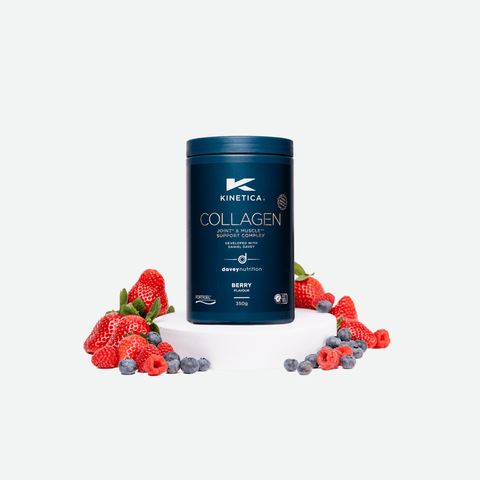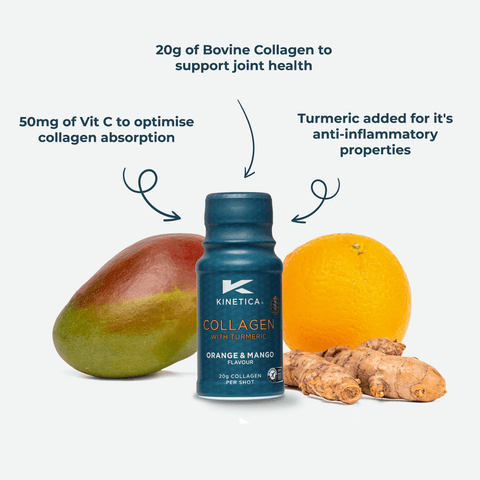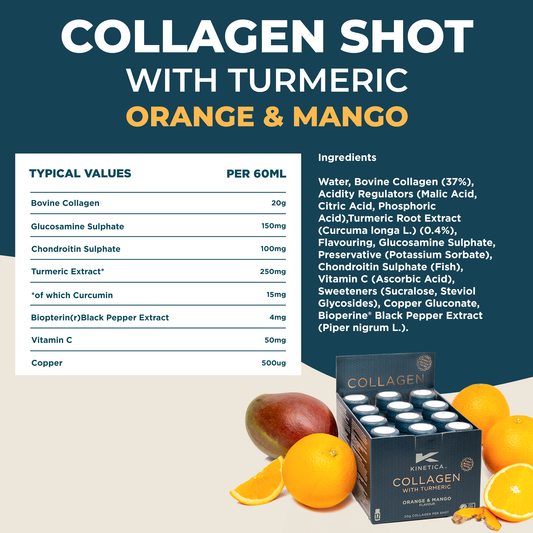A Practical Guide to Choosing Collagen Products

Sorting your nutrition and picking up good habits is one of the best ways to optimise your diet and support your health and performance goals. This means that, whether you’re a weekend warrior or pro athlete, choosing the right supplements is the key to success.
In this guide, we’ll take you through several of the most practical collagen tips we have to help you understand how to pick the right collagen supplements for you.
What is collagen?
Collagen is the most abundant protein in the body and it plays an important role in the formation of connective tissues like cartilage, ligaments, tendons, skin and bone. Supplementing with collagen means that collagen specific amino acids like glycine, proline, hydroxylysine and hydroxyproline, are available for collagen synthesis.
Whilst research has identified at least 28 types of collagen in your body, around 80-90% of the collagen falls into one of three types, which are:
- Type 1 – this type of collagen forms hard tissue in areas like your bones, teeth, tendons, and other connective tissues. It’s also the most abundant form.
- Type 2 – type 2 collagen has a gel-like consistency to provide cushioning and shock absorption for your joints.
- Type 3 – this is found across your organs, muscles, and skin.
We’ve kept it brief here, but you can learn more with our guide to The Different Types of Collagen.
How to choose a collagen supplement
Collagen is a fantastic dietary supplement, with plenty of research to support its inclusion into your diet. From increasing bone strength, density and mass1, to improving joint functionality and reducing pain2, collagen can potentially be incredibly beneficial for your training. There are also dermatological benefits3 to collagen supplementation.
But, choosing products with collagen is not always straightforward. For optimal use, there are several features you should consider before you buy.
Bioavailability
One of the first aspects you need to consider is the bioavailability of your chosen collagen product. Bioavailability refers to the speed and ease with which a substance is absorbed by the body and becomes available for use. Collagen products with a high bioavailability are more effective because they can get to work efficiently.
What this means for you, is that you should look for supplements made with hydrolysed collagen (also referred to as collagen peptides).
Hydrolysis is a chemical reaction that breaks large molecules into smaller ones. In hydrolysed collagen, the small peptides have a lower molecular weight which is easily digested, absorbed, and distributed through your intestinal lining and to the rest of your body4.
All of this is why we only use the best at Kinetica Sports. Our Collagen Powder uses 5g of FORTIGEL® collagen, which has been proven to work effectively in supporting your joints and connective tissues5. (Although, don’t forget, our Collagen Shot with Turmeric also includes hydrolysed collagen to improve absorption).

Buy Now – Collagen Powder Joint* & Muscle** Support Complex
Source
Another key thing to think about is where your collagen is coming from, as this could impact your choice of supplement. The primary sources of collagen are bovine, marine, porcine and vegan collagen alternatives.
Bovine collagen
Bovine collagen is derived from cows, and is high in type 1, 2, and 3 collagen. These are vital components for structural and mechanical tissues in the body, like bone, tendons, ligaments, muscles and more.
If you’re an athlete, there is plenty of research to suggest that supplementing with products with hydrolysed bovine collagen can help support your training. In fact, potential benefits range from improving recovery, increasing joint function, and reducing joint pain6.
If you’re keen to learn more, explore our article on ‘What is Bovine Collagen and its Benefits?’
Porcine collagen
Derived from pig products, porcine collagen is high in type 1 and 3 collagen (like bovine sources), and has been praised for its biocompatibility and similarity to natural human collagen6. It has also been shown to perform well in skeletal, dermatological, and dental applications6.
Marine collagen
Unlike bovine and porcine collagen, which is derived from a single animal, marine collagen sources can cross a variety of fish and sea creatures. These include invertebrates like jellyfish or sponges, tilapia scales, and even waste fish material7.
Hydrolysed marine collagen within oral supplements has become popular because of its dermatological benefits, including reducing the appearance of wrinkles, and increasing skin elasticity7.
Are there vegetarian or vegan sources of collagen?
Traditionally, products with collagen are not suitable for vegetarians or vegans as they’re derived from animal sources. New research is looking into alternative collagen-like supplements derived from yeast2, certain bacteria, or synthetic recombinant technology to produce animal-free collagen products8. Alternatively, there are vegan collagen products which combine the amino acids mentioned above to support collagen synthesis.
Knowing the source of your collagen products is also vital for any allergy or specific dietary requirements. For example, if you have an allergy to fish, you’ll need to avoid marine collagen as this could trigger a reaction. Alternatively, religious considerations need to be taken into account – like avoiding pork or beef.
Format
Recent literature has found a clear connection between the chemical structure of collagen and its efficacy within the body9. In fact, we highlighted this above when we discussed the benefits of hydrolysed collagen. But, we have yet to discuss the format your supplement takes and how this will affect which product with collagen you choose to buy.
In the most practical terms, you need to choose a type of collagen supplement that you feel comfortable taking. Fortunately for you, there are plenty of formats of collagen supplements you can take, so you’ll be sure to find one that suits you.
Liquid collagen
If you prefer to drink your supplements, have you considered liquid collagen as an option? Quick and easy to ingest when you’re on the go, premade liquid collagen shots are perfect if you don’t want to deal with any extra preparation – which makes them perfect for fitting into a busy training schedule.
Our collagen shots for example, are designed with athletes in mind. They’re a fantastic way to slip collagen into your diet without any effort: simply pop the bottle into your kit bag and drink it down 40 - 60 minutes before training or your event.

Buy Now – Collagen Shot with Turmeric
At Kinetica, everything we include in our supplements is for a purpose. So, as well as the collagen shot providing you with easy to digest bovine collagen, it also includes a handful of beneficial ingredients as well. Vitamin C has been proven to assist with collagen production and metabolism10, turmeric contains curcumin, a compound that has strong anti-inflammatory properties11, and is linked with reducing muscle soreness after exercise12. With a whopping 20g of collagen per shot, these are primed to offer you optimal benefits for improving your joint functionality and performance13.
However, we also know that the taste of collagen can take some getting used to, which is why ours are flavoured with a blend of orange and mango.
Collagen powder
Alternatively, you may want to introduce more collagen into your diet through a collagen powder. This can be easily mixed into anything from smoothies to shakes depending on your preference.
Whichever method you prefer to incorporate your collagen powder, make sure it’s something you can commit to regularly as this will give you the best benefits. According to several studies, regular ingestion of collagen has been seen to improve joint function and reduce pain in active adults13,14.
At Kinetica Sports, our collagen powder is expertly formulated with 5g of FORTIGEL®, which is renowned within the industry for being high-quality and easily absorbed by the body. Plus, we’ve added vitamin C and D to optimise the benefits for your skin and bones that come with regular supplementation.

Collagen tablets
Similarly to liquid collagen, collagen tablets are one of the most convenient types of collagen supplement. Simply take the recommended dose each day, usually with a meal, for easy incorporation into your diet.
However, it is worth noting that collagen tablets tend to have less of the active ingredient, which means you need to take multiple tablets to get the recommended serving.
Intended goals
Another key aspect of choosing the right collagen product for your needs is to look at your intended goals, as this will dictate the serving suggestion and type of collagen you should be taking.
As we’ve already mentioned, collagen has a wide range of benefits, including reducing joint pain, improving your skin elasticity, and supporting hair growth15. These benefits are largely influenced by the type and amount of collagen you take at a time, and how you take it.
For example, if you’re solely looking for a supplement with collagen for dermatological purposes, a lower dose of hydrolysed marine collagen will be more effective for your purposes16.
Alternatively, if you want to support more performance and overall health related goals, you should consider taking a higher dose of a collagen that’s rich in types 1 and 3 – like bovine collagen. One 2019 study supported the use of a 15g collagen peptide supplement alongside resistance exercise to improve your fat-free mass and joint health17. At Kinetica Sports, our collagen shots have 20g of collagen per serving, making them the perfect addition to your training program.
Certifications
When you’re choosing any dietary supplement, you should always be on the lookout for quality ingredients and proper certifications to ensure you’re getting the best – and this is no different for products with collagen.
With bovine collagen supplements, look out for whether the cows have been grass-fed and pasture-raised, as this is of higher quality. For marine collagen, look for wild-caught and sustainable fishing practices where possible.
At Kinetica, we use FORTIGEL® bovine collagen, which is derived from grass-fed and pasture-raised cows for high-quality collagen peptides.
A huge part of choosing a nutritional supplement relies on trust. That’s why you should always look for additional certifications that ensure the quality of your supplements. At Kinetica Sports, our collagen powder is batch tested by WADA (World Anti-Doping Agency) to meet their strict standards. It’s also approved by Informed Sport, so you can trust there are no banned substances which could affect your performance.
You know the why, we know how
Whether you’re a gym enthusiast looking to improve your overall joint health, or an athlete looking to return from a ligament or tendon issue, choose Kinetica for your collagen supplements to help you move closer to your goals.
Read more: Collagen Powder for Joint and Tendon Injuries.








